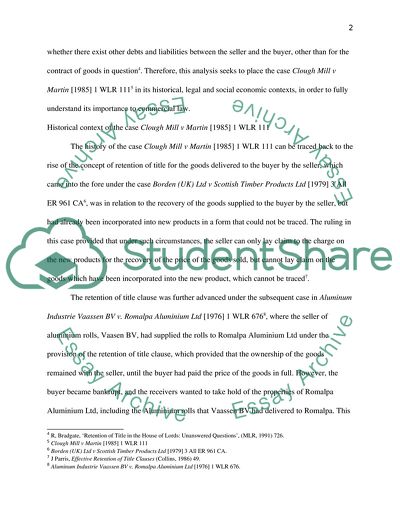Cite this document
(“Place the case in its historical, legal, and where appropriate, social Essay”, n.d.)
Place the case in its historical, legal, and where appropriate, social Essay. Retrieved from https://studentshare.org/law/1636497-place-the-case-in-its-historical-legal-and-where-appropriate-social-and-economic-context-and-discuss-its-importance-to-commercial-law-ie-make-an-in-depth-study-of-it-clough-mill-v-martin-1985-1-wlr-111
Place the case in its historical, legal, and where appropriate, social Essay. Retrieved from https://studentshare.org/law/1636497-place-the-case-in-its-historical-legal-and-where-appropriate-social-and-economic-context-and-discuss-its-importance-to-commercial-law-ie-make-an-in-depth-study-of-it-clough-mill-v-martin-1985-1-wlr-111
(Place the Case in Its Historical, Legal, and Where Appropriate, Social Essay)
Place the Case in Its Historical, Legal, and Where Appropriate, Social Essay. https://studentshare.org/law/1636497-place-the-case-in-its-historical-legal-and-where-appropriate-social-and-economic-context-and-discuss-its-importance-to-commercial-law-ie-make-an-in-depth-study-of-it-clough-mill-v-martin-1985-1-wlr-111.
Place the Case in Its Historical, Legal, and Where Appropriate, Social Essay. https://studentshare.org/law/1636497-place-the-case-in-its-historical-legal-and-where-appropriate-social-and-economic-context-and-discuss-its-importance-to-commercial-law-ie-make-an-in-depth-study-of-it-clough-mill-v-martin-1985-1-wlr-111.
“Place the Case in Its Historical, Legal, and Where Appropriate, Social Essay”, n.d. https://studentshare.org/law/1636497-place-the-case-in-its-historical-legal-and-where-appropriate-social-and-economic-context-and-discuss-its-importance-to-commercial-law-ie-make-an-in-depth-study-of-it-clough-mill-v-martin-1985-1-wlr-111.


